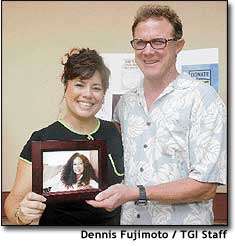LIHU’E — Less than a year ago, Kevin O’Shaughnessy’s life was a mess. On diabetic medicine for 18 years, on an organ-donor waiting list for over three years, and practicing at-home kidney dialysis for eight months, last summer the Kapa’a
LIHU’E — Less than a year ago, Kevin O’Shaughnessy’s life was a mess.
On diabetic medicine for 18 years, on an organ-donor waiting list for over three years, and practicing at-home kidney dialysis for eight months, last summer the Kapa’a resident received life-sustaining organs from an O’ahu man he never even got to meet.
O’Shaughnessy, 47, received a kidney and pancreas transplant at St. Francis Hospital on O’ahu from a man who perished in a traffic accident. That same anonymous donor provided his liver to another Kaua’i man, O’Shaughnessy said.
After 10 days in the hospital on O’ahu, followed by a month of post-operative testing and then three months of at-home isolation due to risk of infection caused by pills taken to ease the transition of foreign organs into a new body O’Shaughnessy emerged in a big way. After less than a year, his immune system was back to normal, and so was his life.
O’Shaughnessy, who played tennis on the island when he was younger, is now off dialysis and insulin, and now playing tennis at an above average level according to the local rating system. He also owns and operates a plant-rental business.
“I’m really grateful to the donor and his family,” said O’Shaughnessy. “We need to spread the word that when you donate an organ, you impact many lives.”
He accepted an invitation to attend a ceremony at the Lihu’e Civic Center where Mayor Bryan J. Baptiste proclaimed April as Organ, Tissue & Eye Donation Awareness Month throughout the county.
O’Shaughnessy is encouraging drivers to sign up to be organ donors when they get or renew their drivers’ licenses, and to keep a backup in writing so that the surviving family members know for certain their loved ones’ intentions.
“In a way, their life is living on in someone else,” he said. “It’s just an amazing gift,” giving high praise to his own family who aided his recovery.
“They’re major components in my recovery,” he said of wife Sandi, and daughter Eryn. Diet and exercise before the transplant surgery helped his body accept the organs, his doctors said.
Eventually, he will write a thank-you note to the donor’s family.
Sarah Moore, whose presence in a wheelchair and mask indicates to some trained eyes that she is recovering from transplant surgery, arrived at the event after Baptiste and others had left, but wanted to give her thanks to donors and representatives of the Organ Donor Center of Hawai’i.
“You guys have really come through for me,” said Moore, a diabetic for 40 years and a dialysis patient for over two years.
A kidney recipient (there are 600 people in Hawai’i on the waiting list for kidneys), she is happy she doesn’t need to go any more to the St. Francis Lihu’e Kaua’i Dialysis Satellite Facility, “because it hurts.”
“I’m glad I’m not used to it anymore,” she said.
She is also thankful for another reason: “It’s been so much fun to be able to eat anything I want to again.”
She had high praise for the St. Francis Kaua’i nurses, saying they try very hard to keep patients alive.
Also at the event were family members of donors, including Roxanne Pascua of Hanapepe, daughter of Flora Coleman whose liver, kidneys, pancreas, heart valves and other organs helped others live longer lives.
Representing other donors were family members Stanley Funaku, Esther Shigeta and Wendy Kruse, whose loved ones also donated organs after they died.
Members of every Lions Club branch on the island showed up for the proclamation: East Kaua’i, West Kaua’i, Koloa, Kapa’a and North Shore.
The Lions maintain an eye bank on O’ahu, and are responsible for supplying raw materials necessary for 2,000 corneal transplants each year in the state alone.
The Kaua’i Filipino-American Jaycees, Kaua’i Filipino Community Council and Organ Donor Center of Hawai’i host an organ-donor awareness event next Saturday, April 12, from 3 p.m. to 6 p.m., at the Wilcox Hospital conference rooms.
It is free and open to the public, but focuses on the island’s Filipino community. Filipinos are the largest ethnic group on the Hawai’i waiting list for kidneys, and are underrepresented on the list of donors.
Where kidneys are concerned, similar ethnic backgrounds are important for donor and recipient matches.
Staff Writer Paul C. Curtis can be reached at mailto:pcurtis@pulitzer.net or 245-3681 (ext. 224).


